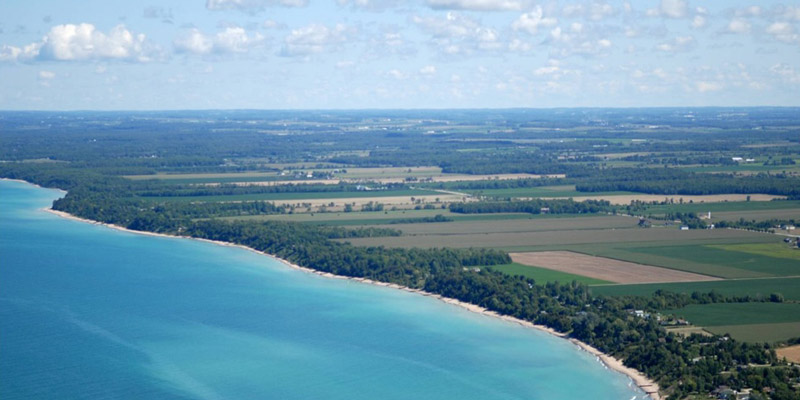Multiple Objective and Multiple Stakeholder Decision Making in Water Resources Management
Principal Investigator - Keith Hipel, Professor, University of Waterloo (2001-2004)

Challenge
Water resources projects often affect many stakeholders, who may be acting cooperatively or competitively. Projects involving water supply, distribution and treatment must conform to multiple objectives and a range of quantitative and qualitative criteria, including stakeholders’ values and preferences in the basic design of policies. Effective conflict resolution procedures and methods can be formulated from a systems viewpoint to encourage equitable dispute resolution.
This research developed a range of decision making tools to respond to multi-stakeholder projects from an interdisciplinary perspective. They looked at a range of issues, from drinking water contamination to international bulk water exports. Specifically, formal decision making techniques were created using a systems engineering approach. The research considered societal aspects of water resources problem solving relevant to policy and governance within an integrated water resources management framework, and provided strategic analyses of water export conflicts. Key end users of these results are policy makers, those working in resource management and dispute resolution to help create sustainable and socially responsible solutions.
Project
This research on multiple objective-multiple participant decision making was subdivided into five main components: policy and enforcement, conflict resolution, fair allocation of water, alternative solution assessment, and case studies from Canada. The project research studies investigated water policy problems using systems tools such as the graph model for conflict resolution, multiple criteria decision analysis, and cooperative game theory.
Within the topic of policy and enforcement, researchers completed qualitative and quantitative risk analyses of the Walkerton water crisis, producing insights into the causes of the incident. Within the research component on conflict resolution, methodological advances were accomplished to allow the graph model for conflict resolution to handle a range of complications that arise in practice, such as tracing the evolution of a conflict, taking uncertain preference information and strength of preference into account, and describing how emotions can affect decision making under conflict.
The utility of these new decision technologies was demonstrated via strategic analyses of real world disputes arising over pollution of an underground aquifer, degradation of surface water quality, and sustainable development. Under the category of fair water allocation, a complex systems model founded upon concepts from cooperative game theory, economics and hydrology, was developed for equitably solving water allocation problems with application to the South Sasksatchewan River Basin and Aral Sea Region. The researchers also applied the systems tools to the issue of Canadian bulk water exports to better understand the problem and to provide guidance for strategic decision making.
Through conflict analyses, researchers found that bulk water export disputes in Western Canada (Sun Belt Conflict) and Eastern Canada (Lake Gisborne Controversy) would have been strategically possible, and posed potentially severe ecological and political consequences for Canada as a nation. Once these transactions were initially made, exports could then be treated as a commodity under the North American Free Trade Agreement (NAFTA), setting a precedent for future exports across the country.
Outputs
The research expanded techniques for multiple criteria decision analysis (MCDA) to permit more realistic assessment of alternative solutions to water resources problems.
- Design of new procedures for screening out inferior solutions from further analyses. Researchers also defined a unique approach to multiple criteria alternative classification. They applied these techniques to water supply in the Waterloo Region and fluctuating water levels in the Great Lakes. They also used the multiple participant decision-making technologies in strategic analyses of aquaculture disputes in Western Canada and conflict involving First Nations in the James Bay region.
Researchers shared their results through publication of research findings in national and international journals, conference proceedings, encyclopaedia, and books.
Select Presentations
Li, K.W., Kilgour, D.M., and Hipel, K.W., “Status Quo Analysis in Conflict Resolution”, presented at Group Decision and Negotiation 2002, held at Curtin University, Perth, Australia, August 26-29, 2002. Hamouda, L., Hipel, K.W., and Kilgour, D.M., “Strength of Preference in Conflict Resolution”, presented at Group Decision and Negotiation 2002, held at Curtin University, Perth, Australia, August 26-29, 2002.
Kilgour, D.M. and Hipel, K.W., “Demonstration of the Decision Support System GMCR II”, presented at Group Decision and Negotiation 2002, held at Curtin University, Perth, Australia, August 26-29, 2002.
Hipel, K.W., keynote presentation on “Decision Support Systems in Water Resources Management,” delivered at the Third International Conference on Water Resources and Environment Research: Water Quantity and Quality Aspects in Modeling and Management of Ecosystems, ICWRER 2002, held at the Dresden University of Technology, Dresden, Germany, July 22-25, 2002.
Kilgour, D.M., plenary presentation on “Intergovernmental Decision Making – A Strategic Approach Using GMCR II,” delivered at the Workshop on Resolving Conflicts – Acknowledging a Scientific Approach, held at Zentrum für interdisziplinäre Forschung (Centre for Interdisciplinary Research), Universitat Bielefeld, Bielefeld, Germany, June 2002.
Noakes, D.J., Fang, L., Hipel, K.W., and Kilgour, D.M., “Conflict Resolution in Resource Management,” presented at the 44th Annual Conference of the Canadian Operational Research Society (CORS), held at the Colony Hotel, Toronto, Ontario, June 3-5, 2002.
Zhang, J., Fang, L., and Hipel, K.W., “Walkerton Drinking Water Crisis: Modeling and Analysis,” presented at the 44th Annual Conference of the Canadian Operational Research Society (CORS), held at the Colony Hotel, Toronto, Ontario, June 3-5, 2002.
Select Publications
Hipel, K.W., Kilgour, D.M., and Zhao, N.Z. (2003). “Risk Analysis of the Walkerton Drinking Water Crisis”, Canadian Water Resources Journal, Vol. 28, Sept., 2003.
Noakes, D. J., Fang, L., Hipel, K. W., and Kilgour, D.M. (2003). “An Examination of the Salmon Aquaculture Conflict in British Columbia using the Graph Model for Conflict Resolution”, Fisheries Management and Ecology, Vol. 10, No.3, pp.123-137.
Obeidi, A., Hipel, K.W., and Kilgour, D.M. (2002). “Canadian Bulk Water Exports: Analyzing the Sun Belt Conflict using the Graph Model for Conflict Resolution”, Knowledge, Technology and Policy, Vol. 14, No. 4, pp. 145 – 163.
Hipel, K.W., Kilgour, D.M., Fang, L., and Li, K.W. (2002). “Resolution of Water Conflicts between Canada and the United States”, invited paper published as Section 4.3 in State of the Art Report on Systems Analysis Methods for Resolution of Conflicts in Water Resources Management, edited by K.D.W. Nandalal and S.P. Simononvic, a Report prepared for the Division of Water Sciences, United Nations Educational, Science and Cultural Organization (UNESCO), Paris, France.
Outcomes
- The project used practical problems arising in water resources management for their case study approach. This helped create a deeper understanding and appreciation of the value systems of all sides of the various water resource conflicts. Through formal strategic analyses, researchers developed potential ways to resolve these scenarios in the long term.
- The researchers’ advancements in conflict resolution can be employed in bargaining and negotiation when attempting to reach a win/win resolution. When bargaining, the research proposed use of a third party that could assist in helping competitors in a dispute to reach a satisfactory agreement.
- Additionally, the conflict resolution technologies could be utilized within an integrative adaptive management framework – a system of “learning by doing” such that management decisions and policies are treated as experiments.




